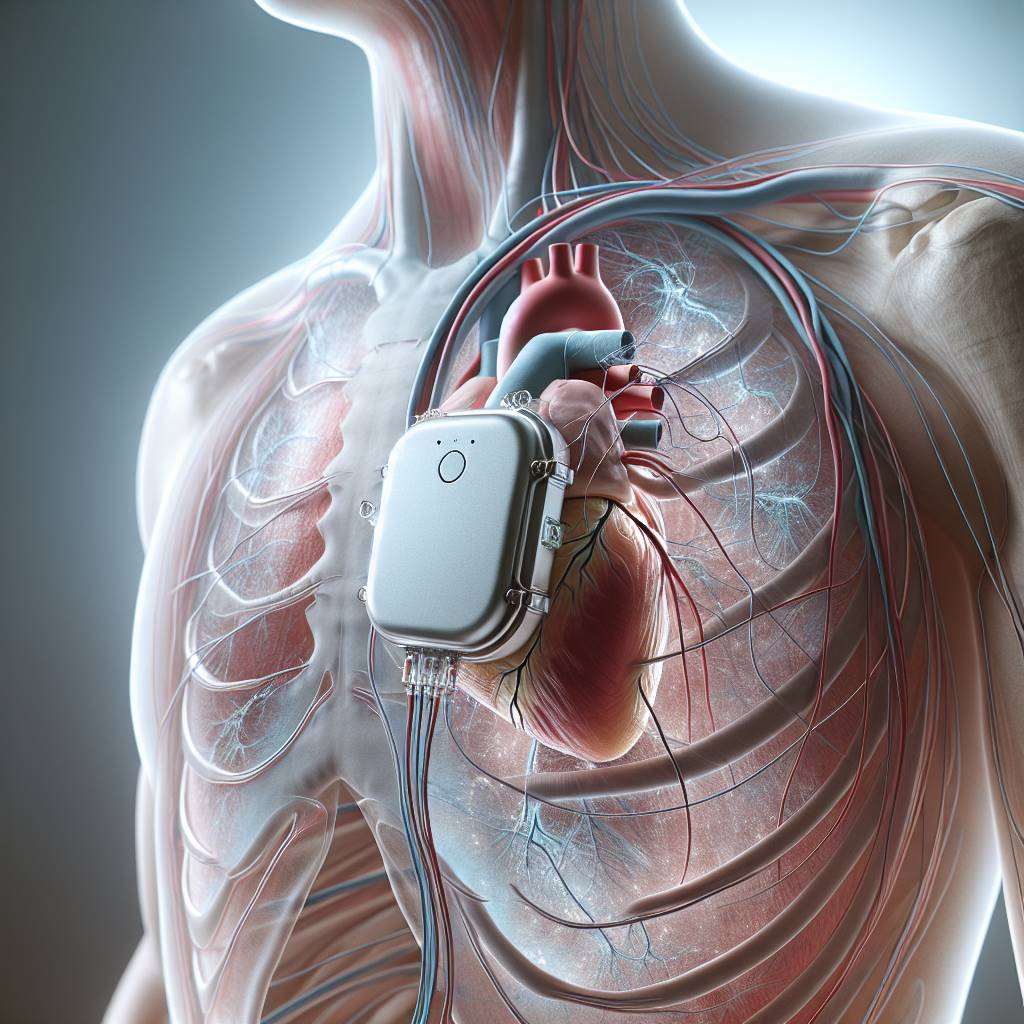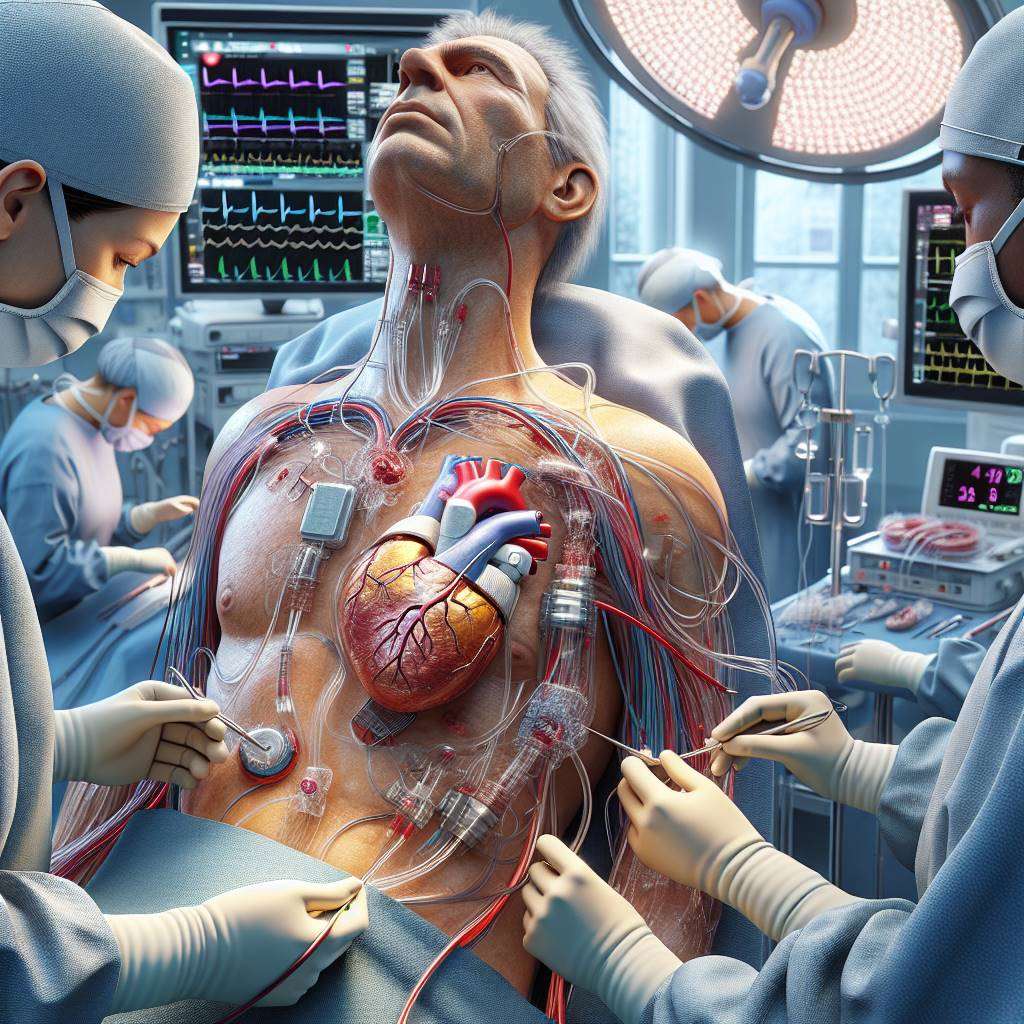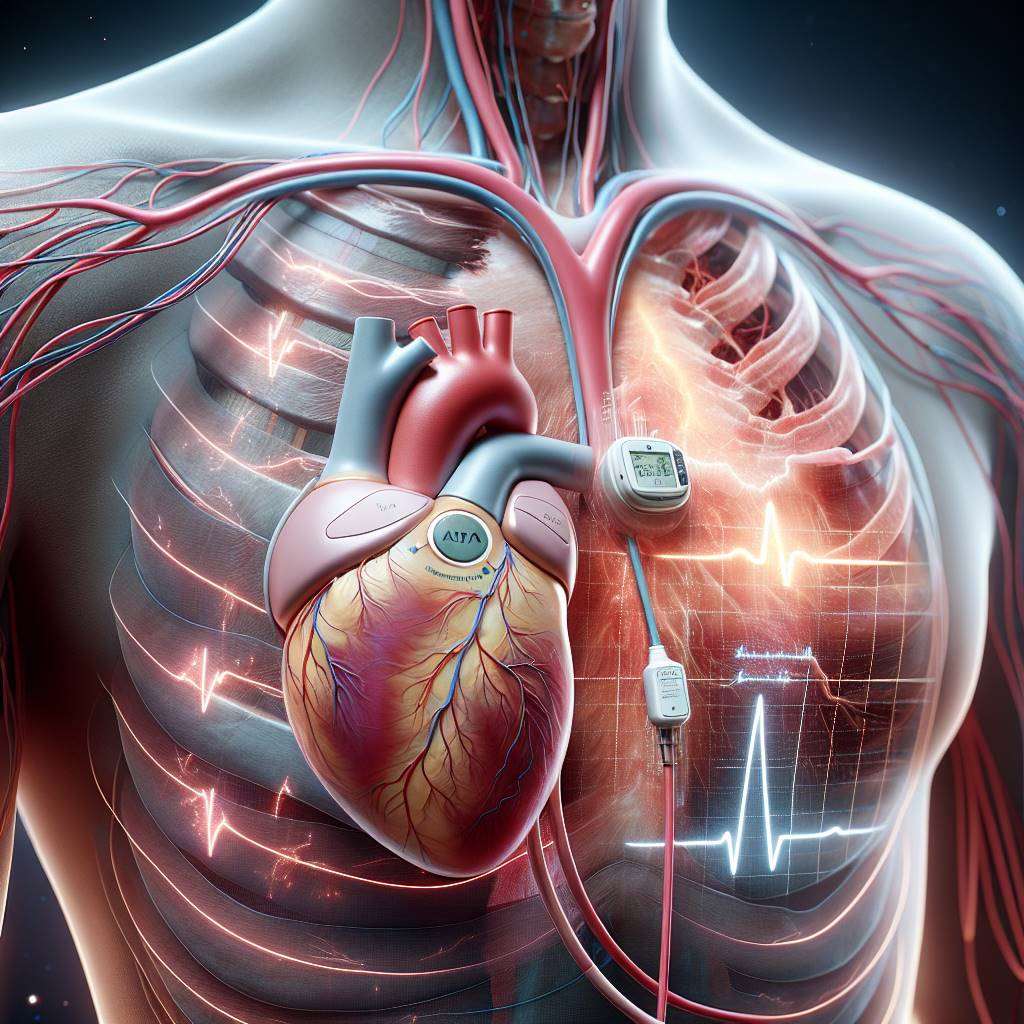Sudden cardiac death (SCD) is a life-threatening event caused by the abrupt loss of heart function, often due to arrhythmias. An Automatic Implantable Cardioverter Defibrillator (AICD) is a medical device designed to monitor and correct abnormal heart rhythms. Understanding how an AICD works can help patients and families make informed decisions about managing heart health and preventing SCD.
Medical disclaimer: This content is for general awareness and does not replace a doctor’s consultation. For diagnosis or treatment decisions, consult a qualified specialist.
With advancements in cardiac care, AICDs have become a critical tool for individuals at high risk of SCD. By delivering life-saving electrical shocks, these devices can restore normal heart rhythms. This article explores the role of AICDs, their effectiveness, and who might benefit most from this innovative treatment option.
What Is an AICD and How Does It Work?
An Automatic Implantable Cardioverter Defibrillator (AICD) is a small, battery-powered device implanted under the skin, typically near the chest. It continuously monitors the heart's electrical activity and detects abnormal rhythms, such as ventricular tachycardia or ventricular fibrillation. These conditions can lead to sudden cardiac arrest if not treated promptly.
When the AICD identifies a dangerous arrhythmia, it delivers a controlled electrical shock to restore the heart's normal rhythm. The device also records heart activity, which can help doctors adjust treatment plans. Modern AICDs are highly advanced, offering features like pacing for slow heart rates and wireless communication for remote monitoring.
The implantation procedure is minimally invasive and typically performed under local anesthesia. Recovery is usually quick, allowing patients to resume normal activities within a few weeks.

Understanding Sudden Cardiac Death: Causes and Risks
Sudden cardiac death (SCD) occurs when the heart stops functioning unexpectedly, often due to severe arrhythmias. The most common causes include coronary artery disease, heart failure, and inherited conditions like long QT syndrome. SCD is a leading cause of death worldwide, making early identification of risk factors crucial.
Certain groups are at higher risk of SCD, including individuals with a history of heart attacks, weakened heart muscles, or genetic predispositions. Lifestyle factors like smoking, obesity, and uncontrolled diabetes can further increase the risk. Recognizing these risks allows for timely interventions, such as lifestyle changes or the use of devices like AICDs.
- Coronary artery disease: A major contributor to SCD.
- Heart failure: Weakens the heart's ability to pump blood effectively.
- Inherited conditions: Genetic disorders that affect heart rhythm.
Can an AICD Save Lives in High-Risk Patients?
For individuals at high risk of sudden cardiac death, an AICD can be a life-saving intervention. Studies have shown that AICDs significantly reduce mortality rates in patients with severe heart conditions. By detecting and correcting life-threatening arrhythmias, these devices provide a critical safety net.
High-risk patients often include those with heart failure, a history of cardiac arrest, or certain genetic conditions. The AICD continuously monitors the heart and delivers therapy only when needed, ensuring that patients are protected without unnecessary interventions. This makes it an effective option for long-term management.
While AICDs are not a cure for underlying heart conditions, they play a vital role in preventing sudden cardiac death. Combined with medications and lifestyle changes, they offer a comprehensive approach to managing cardiac risk.
How Effective Are AICDs in Preventing Cardiac Arrest?
The effectiveness of AICDs in preventing cardiac arrest has been well-documented in clinical studies. Research indicates that these devices can reduce the risk of sudden cardiac death by up to 50% in high-risk populations. This makes them one of the most reliable tools in modern cardiology.
AICDs are particularly effective in patients with ventricular arrhythmias, which are the leading cause of sudden cardiac arrest. By delivering timely electrical shocks, the device can restore normal heart function within seconds. This rapid response is critical in preventing fatal outcomes.
| Condition |
Effectiveness of AICD |
| Ventricular Tachycardia |
Highly effective |
| Heart Failure |
Moderately effective |
| Inherited Arrhythmias |
Effective in specific cases |
Who Should Consider Getting an AICD Implant?
Not everyone is a candidate for an AICD implant. The device is typically recommended for individuals with a high risk of sudden cardiac death. This includes patients with a history of cardiac arrest, severe heart failure, or genetic conditions like hypertrophic cardiomyopathy.
Doctors assess eligibility based on factors like heart function, medical history, and the presence of arrhythmias. Diagnostic tests, such as an echocardiogram or Holter monitoring, may be used to evaluate the need for an AICD. Patients with a life expectancy of more than one year and a high risk of arrhythmias are prime candidates.
If you or a loved one is at risk of sudden cardiac death, consult a cardiologist to discuss whether an AICD is the right choice. Early intervention can save lives and provide peace of mind for patients and their families.
Latest Research on AICDs and Sudden Cardiac Death
Automatic Implantable Cardioverter Defibrillators (AICDs) have revolutionized the prevention of sudden cardiac death (SCD), particularly in patients with high-risk heart conditions. Recent studies highlight that AICDs significantly reduce mortality rates in individuals with ventricular arrhythmias or severely reduced ejection fraction.
Data from clinical trials, such as the MADIT-II and SCD-HeFT studies, show that AICDs can lower the risk of SCD by up to 31% in patients with ischemic or non-ischemic cardiomyopathy. These devices continuously monitor heart rhythms and deliver life-saving shocks to restore normal rhythm during dangerous arrhythmias.
However, research also emphasizes the importance of patient selection. Not everyone with heart disease benefits from an AICD, and careful evaluation by a cardiologist is essential to determine eligibility.

AICD vs. Pacemaker: Key Differences Explained
While both AICDs and pacemakers are implantable devices used to manage heart conditions, they serve distinct purposes. A pacemaker primarily regulates slow or irregular heartbeats, ensuring the heart maintains a steady rhythm. In contrast, an AICD is designed to prevent sudden cardiac death by detecting and treating life-threatening arrhythmias like ventricular fibrillation.
Here’s a quick comparison:
| Feature |
Pacemaker |
AICD |
| Primary Function |
Regulates slow heartbeats |
Prevents sudden cardiac death |
| Shock Delivery |
No |
Yes |
| Target Conditions |
Bradycardia, heart block |
Ventricular arrhythmias |
Both devices improve quality of life, but their applications depend on the patient’s specific heart condition. Consulting a cardiologist is crucial to determine which device is appropriate.
What to Expect During an AICD Implant Procedure
The AICD implantation procedure is typically performed under local anesthesia with sedation. It is a minimally invasive surgery that usually takes 1–2 hours. During the procedure, the cardiologist places the device under the skin, usually near the collarbone, and connects it to the heart using thin wires called leads.
Patients may feel mild discomfort during the procedure, but it is generally well-tolerated. After the implantation, the AICD is tested to ensure it functions correctly. Most patients can return home within a day, but they are advised to avoid strenuous activities for a few weeks to allow proper healing.
Post-procedure, regular follow-ups are necessary to monitor the device and ensure it is working optimally. Patients should also be aware of any unusual symptoms, such as dizziness or chest pain, and report them to their doctor immediately.
Are There Risks or Side Effects of AICDs?
Like any medical procedure, AICD implantation carries some risks. Common side effects include mild pain, swelling, or bruising at the implantation site. In rare cases, complications such as infection, bleeding, or lead displacement may occur.
Some patients may experience inappropriate shocks from the AICD, which can be distressing. These shocks occur when the device misinterprets a normal rhythm as an arrhythmia. Regular device checks can help minimize this risk.
- Infection at the implantation site
- Allergic reactions to materials or medications
- Damage to blood vessels or heart tissue
Despite these risks, the benefits of preventing sudden cardiac death often outweigh the potential complications. Discussing concerns with a cardiologist can help patients make informed decisions about AICD implantation.
Signs You May Need an AICD for Heart Health
Patients with certain heart conditions may benefit from an AICD to reduce their risk of sudden cardiac death. Common signs that you may need an AICD include a history of ventricular arrhythmias, a severely reduced ejection fraction (less than 35%), or a prior cardiac arrest.
Other indications include:
- Frequent fainting episodes due to heart rhythm issues
- Severe heart failure or cardiomyopathy
- A family history of sudden cardiac death
If you experience symptoms like palpitations, dizziness, or unexplained fainting, consult a cardiologist. Early evaluation can help determine whether an AICD is necessary to protect your heart health and prevent life-threatening complications.
How AICDs Monitor and Correct Irregular Heartbeats
An Automatic Implantable Cardioverter Defibrillator (AICD) is a small device implanted in the chest to monitor and treat irregular heart rhythms, also known as arrhythmias. It continuously tracks the heart's electrical activity and identifies abnormal rhythms, such as ventricular tachycardia or ventricular fibrillation.
When the AICD detects a dangerous rhythm, it delivers a controlled electrical shock to restore the heart to its normal rhythm. This process, called defibrillation, can prevent sudden cardiac death. The device also provides pacing therapy for slower heart rates, ensuring comprehensive heart rhythm management.

Cost of AICD Implants in India: What to Know
The cost of an AICD implant in India varies depending on the type of device, hospital, and location. On average, the procedure can range from ₹5,00,000 to ₹10,00,000. This includes the cost of the device, surgery, and hospital stay.
While the price may seem high, many hospitals offer financing options or accept health insurance to make the procedure more affordable. Patients should consult their cardiologist to understand the specific costs involved and explore government schemes or private insurance coverage for financial assistance.
It’s essential to choose a reputed hospital with experienced cardiologists to ensure the success of the procedure and minimize complications.
Life After an AICD Implant: Tips and Precautions
Living with an AICD implant requires certain lifestyle adjustments to ensure the device functions optimally. Patients should avoid strong electromagnetic fields, such as those from MRI machines or industrial equipment, as these can interfere with the device.
Regular follow-ups with a cardiologist are crucial to monitor the device and overall heart health. Patients are also advised to carry an AICD identification card at all times for emergencies. Physical activities are generally safe, but contact sports should be avoided to prevent damage to the implant site.
- Take prescribed medications as directed.
- Report any unusual symptoms, such as dizziness or fainting, to your doctor immediately.
- Maintain a heart-healthy diet and exercise routine.
Can an AICD Prevent Sudden Death in Young Patients?
Sudden cardiac death (SCD) can occur in young individuals due to conditions like hypertrophic cardiomyopathy, long QT syndrome, or other inherited arrhythmias. An AICD can be a lifesaving option for high-risk young patients by detecting and treating life-threatening arrhythmias.
Studies show that AICDs significantly reduce the risk of SCD in young patients with a history of cardiac arrest or those diagnosed with genetic heart conditions. However, the decision to implant an AICD in younger individuals must be carefully evaluated by a cardiologist, considering the risks, benefits, and psychological impact.
Early diagnosis and intervention are key to preventing SCD in young patients, making AICDs a critical tool in modern cardiology.
Real-Life Success Stories of AICD Patients
Many patients with AICD implants have shared inspiring stories of how the device saved their lives. For instance, a 45-year-old man with a history of ventricular fibrillation reported that his AICD successfully delivered a shock during a life-threatening episode, allowing him to seek immediate medical care.
Another case involved a young woman with long QT syndrome, whose AICD prevented sudden cardiac arrest during a stressful situation. These stories highlight the importance of AICDs in managing high-risk patients and providing peace of mind to families.
Such success stories emphasize the life-saving potential of AICDs and encourage individuals at risk to consult their cardiologists about this advanced treatment option.
Best Aicd Implantation Doctors in India
Dr. Balbir Singh, a renowned cardiologist with over 30 years of experience, is affiliated with Medanta - The Medicity, Gurugram. He specializes in electrophysiology and cardiac device implantation. Another expert is Dr. Praveen Chandra, Chairman of Interventional Cardiology at Medanta - The Medicity, with 25+ years of experience in advanced cardiac care. Both are internationally recognized for their expertise in AICD implantation.
Learn more on best aicd implantation doctors in india
Best Aicd Implantation Hospitals in India
Fortis Escorts Heart Institute, New Delhi, a NABH and JCI-accredited hospital, is a leader in advanced cardiac care, offering cutting-edge AICD implantation. Apollo Hospitals, Chennai, also NABH-accredited, is known for its multidisciplinary cardiac team and international patient services. Both hospitals have a strong track record of success stories and use the latest technologies for cardiac treatments.
Find more best aicd implantation hospitals in india
Aicd Implantation Cost in India
The cost of AICD implantation in India typically ranges from INR 5,00,000 to INR 10,00,000 (approximately USD 6,000 to USD 12,000). Factors influencing costs include the type of device, hospital category, and the doctor’s expertise. The average hospital stay is 2-3 days. India offers a significant cost advantage compared to Western countries, with options for medical insurance and third-party financing.
Learn aicd implantation cost in india
Aicd Implantation Treatment in India
AICD implantation in India involves placing the device under the skin, typically near the collarbone, with leads connected to the heart. Advanced technologies like 3D mapping and minimally invasive techniques are used. Recovery usually takes 1-2 weeks. Top hospitals in India follow global medical protocols and adopt innovations like remote monitoring for post-procedure care.
Learn on Aicd Implantation Treatment in India
FAQs
What is an AICD?
An AICD (Automatic Implantable Cardioverter Defibrillator) is a small device implanted in the chest to monitor and correct life-threatening heart rhythm abnormalities, such as ventricular fibrillation or ventricular tachycardia.
How does an AICD prevent sudden cardiac death?
An AICD continuously monitors the heart's rhythm. If it detects a dangerous arrhythmia, it delivers an electrical shock to restore a normal rhythm, thereby preventing sudden cardiac death.
Who is a candidate for an AICD?
Patients with a history of cardiac arrest, severe ventricular arrhythmias, or conditions like heart failure with reduced ejection fraction are typically candidates for an AICD.
Is the AICD implantation procedure safe?
Yes, AICD implantation is a safe and commonly performed procedure. Risks are minimal when performed by experienced cardiologists in advanced medical facilities.
What is the recovery time after AICD implantation?
Most patients recover within 1-2 weeks after AICD implantation. They can resume normal activities gradually, but heavy lifting and strenuous activities should be avoided for a few weeks.
How long does an AICD last?
The battery life of an AICD typically ranges from 5 to 10 years, depending on usage. Regular follow-ups are necessary to monitor the device's performance.
Are there any lifestyle restrictions with an AICD?
Patients with an AICD should avoid strong electromagnetic fields, certain medical procedures like MRI (unless the device is MRI-compatible), and contact sports to prevent damage to the device.
Can an AICD cure heart conditions?
An AICD does not cure heart conditions but manages life-threatening arrhythmias. It works as a preventive measure to reduce the risk of sudden cardiac death.
What are the risks associated with AICD implantation?
Risks include infection, bleeding, or lead displacement. However, these complications are rare when the procedure is performed by skilled specialists in advanced hospitals.
Is AICD implantation covered by insurance in India?
Yes, most health insurance policies in India cover AICD implantation. Patients should confirm coverage details with their insurance provider before the procedure.
Understanding AICD: When Upgrades Are Necessary and Common Misconceptions
An Automated Implantable Cardioverter Defibrillator (AICD) is a crucial device for patients at risk of life-threatening heart rhythms. However, there are times when an AICD may need to be removed or upgraded. Understanding the reasons behind these decisions is vital for patients and their families. For a deeper insight into this topic, check out our blog on AICD removal or upgrade: when and why it might be needed.
Additionally, there are many myths surrounding AICDs that can lead to confusion and fear. It's essential to separate fact from fiction to make informed decisions about heart health. To help clarify these misconceptions, read our article on myths about AICDs: debunking common misconceptions.
By educating yourself on the realities of AICDs, you can better navigate your heart health journey and engage in meaningful discussions with your healthcare provider.